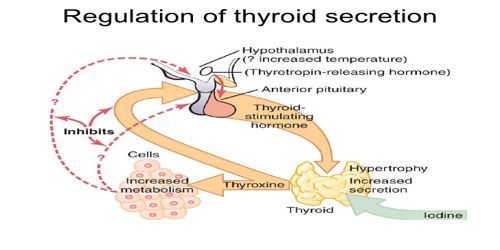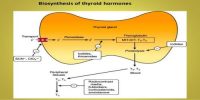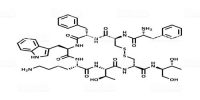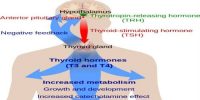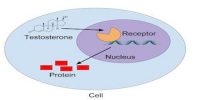Thyroid hormones are two hormones produced and released by the thyroid gland, namely triiodothyronine (T3) and thyroxine (T4). They act to increase the basal metabolic rate, affect protein synthesis, help regulate long bone growth and neural maturation, and increase the body’s sensitivity to catecholamines by permissiveness. The thyroid gland secretes from the follicular cells two significant hormones:
(a) Thyroxin (T4)-93%,
(b) Tri-iodothyronine (T3)-7%.
Regulation of thyroid hormone secretion
There are several factors which help to keep the secretion rate and normal level of T3 and T4 in the serum.
The most important factors are as follows:
(1) Thyroid stimulating hormone (TSH):
(a) An action of TSH:
- Increased proteolysis of thyroglobulin (early important effect),
- Increased activity of iodide pump,
- Increased iodination of tyrosine and ↑ coupling,
- Increased size and secretory activity of the thyroid cells,
- Increased number of the thyroid cells and conversion to columnar from cuboidal cells.
(b) ↑ secretion TSH by TRH Mechanism:
Mechanism:
Anterior pituitary secretion of TSH is controlled by a hypothalamus hormone, TRH.
TRH directly affects the output of TSH; i.e.,
↑ TRH → ↑TSH
↓ TRH → ↓ TSH.
- Cold exposure → potent stimulation of hypothalamus →↑TRH →↑ TSH →↑ T3, T4 →↑ BMR →↑ Heat production.
- Excitement and anxiety →↓ TRH →↓ TRH.
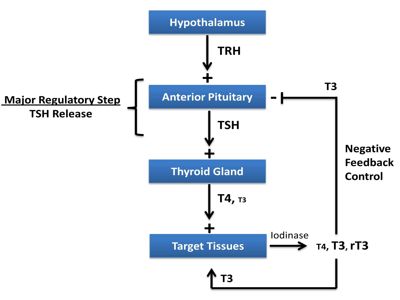
Fig: Regulation of thyroid hormone secretion
(c) Decrease the secretion of TSH by the feedback effect of thyroid hormone. The negative feedback effect of thyroid hormones on TSH and & TRH.
↑ T3, T4 →↓ TRH, and ↓ TRH
↓ T3, T4 →↑ TRH, and ↑ TRH
When the rate of thyroid hormones secretion rises to about 1.75 times normal, the rate at TSH secretion falls essentially to zero.
(2) Thyroid autoregulation:
(i) Increased ingestion of iodine does not increase thyroid hormone levels in the plasma or decrease TSH secretion. It is probably due to an effect of organic iodine, mainly by MIT, excess of which depresses the transport into the follicular cell.
(ii) Role of iodine: Organic iodine (as MIT) causes the sensitivity of thyroid response to TSH. Iodine deficiency increases sensitivity and excess iodine decreases the sensitivity.
For normal individuals, this regulation results in a fairly stable day-to-day level of circulating thyroid hormones.
